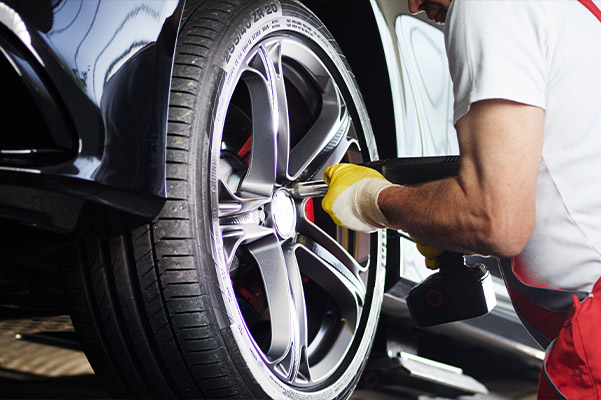The Link Between Tire Solution and Gas Effectiveness
Effectiveness in fuel consumption is a paramount problem for lorry proprietors seeking to optimize their driving experience. Amongst the numerous variables that affect gas performance, tire solution stands apart as a vital aspect that frequently goes forgotten. The complex relationship in between tire upkeep and fuel economic situation is a testimony to the complex functions of a car. By comprehending just how tire care directly influences the effectiveness of your vehicle, you can open a realm of opportunities that not only improve efficiency however additionally add to set you back savings in the lengthy run.
Relevance of Appropriate Tire Rising Cost Of Living
Correct tire inflation is an essential aspect in optimizing fuel performance and guaranteeing optimum vehicle efficiency. When tires are underinflated, it develops more rolling resistance, creating the engine to work more challenging and burn more gas to maintain the exact same rate. On the other hand, overinflated tires can cause a harsher adventure, unequal tire wear, and lowered traction. To discover the recommended tire pressure for your automobile, refer to the owner's guidebook or the sticker label located on the vehicle driver's side door jamb.
Preserving the correct tire stress not only improves gas efficiency yet likewise enhances driving safety and security. Frequently checking and readjusting tire pressure, specifically previously long journeys, is a simple yet efficient method to optimize your automobile's fuel economic situation and guarantee a smooth driving experience.
Impact of Tire Footstep Deepness
Maintaining the recommended tire stress is important for ideal automobile efficiency and gas effectiveness; in a similar way, the step deepness of your tires plays an important function in making certain safety and traction on the road. Tire walk deepness straight impacts the capacity of your tires to grasp the roadway surface area, particularly in damp or slippery conditions. Frequently checking your tire walk depth and replacing tires when needed is a basic yet efficient way to advertise both security and fuel performance on the roadway.
Function of Wheel Alignment in Performance
Making sure accurate wheel positioning is vital for maximizing car performance and optimizing fuel economic climate. Proper wheel positioning involves changing the angles of the wheels to supplier specs, making certain that they are alongside each various other and perpendicular to the ground. When wheels are misaligned, it can cause uneven tire wear, boosted moving resistance, and reduced gas efficiency.

Furthermore, precise wheel positioning can likewise enhance dealing with and stability, decreasing the amount of energy needed to maneuver the lorry (morris tire service). By lessening unnecessary friction and drag, proper wheel alignment plays an essential role in boosting total automobile effectiveness and fuel economic situation. Normal wheel positioning checks and adjustments are essential for maintaining optimum efficiency and making best use of gas cost savings
Connection In Between Tire Upkeep and MPG
A necessary element of enhancing fuel efficiency in lorries is the upkeep of tires and their direct influence on miles per gallon (MPG) Proper tire upkeep plays a crucial function in optimizing gas economy. One key aspect impacting MPG is tire stress. Underinflated tires boost rolling resistance, triggering the engine to function tougher and shed even more fuel. On the various other hand, overinflated tires minimize the contact spot with the road, bring about unequal wear and lowered gas effectiveness. Frequently checking and preserving the correct tire stress can considerably boost MPG.
In addition, tire walk deepness also affects fuel performance. Damaged footsteps lower traction, particularly in damp problems, forcing the engine to exert more power to preserve rate. This raised resistance cause higher fuel usage. By making sure tires have ample tread depth, motorists can boost both safety and fuel economy.
Fundamentally, appropriate tire upkeep, consisting of tracking tire pressure and tread depth, is straight connected to attaining ideal MPG. By integrating regular tire inspections and maintenance into a vehicle treatment routine, chauffeurs can not only expand tire life however likewise improve gas effectiveness, eventually saving cash and minimizing environmental impact.

Tips for Fuel-Efficient Tire Treatment
Provided the critical connection between tire upkeep and fuel performance, carrying out reliable methods for optimizing tire treatment is essential to boosting general lorry efficiency. To guarantee fuel-efficient tire treatment, regular tire pressure checks are essential. Appropriately inflated tires lower rolling try this resistance, enhancing gas performance and extending tire life expectancy. Additionally, keeping appropriate wheel alignment and harmonizing helps disperse weight equally, avoiding uneven tire wear and enhancing gas consumption. Turning tires at advised intervals promotes also tread wear, improving gas efficiency by making sure all tires add equally to car efficiency. It is also critical to examine tires for indicators of damage, such as you can try these out cuts, slits, or bulges, as these problems can affect gas efficiency and general safety and security. Choosing tires with low rolling resistance can dramatically improve fuel economy. By integrating these fuel-efficient tire treatment tips into a routine upkeep timetable, chauffeurs can make the most of fuel effectiveness, reduce operating expenses, and lengthen the life of their tires.
Final Thought
By consistently preserving tires and complying with fuel-efficient tire treatment suggestions, Learn More vehicle drivers can optimize their automobile's efficiency and reduce fuel intake. It is essential to prioritize tire maintenance to not just conserve money on fuel expenses yet additionally to promote general lorry efficiency.